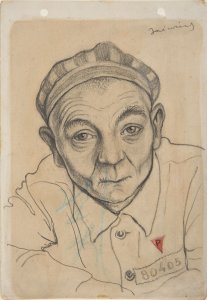Presented By: University of Michigan-Dearborn
Forbidden Art: Illegal Works by Concentration Camp Prisoners
Teresa Wontor-Cichy, Research Expert, Auschwitz Birkenau State Museum

Forbidden Art tells the emotional story of the illegal artwork created by concentration camp prisoners during WWII. The Alfred Berkowitz Gallery is honored to bring this powerful exhibition, organized by the Auschwitz-Birkenau State Museum and The Polish Mission of the Orchard Lake Schools, to the Dearborn community.
Our imagination of life in Nazi concentration camps is dominated by darkness, delineated by concepts difficult to fully comprehend: slave labor, extreme hunger, roundups, selection, and overwhelming, and after a while normalized, death. The Forbidden Art exhibition brings viewers a new perspective on concentration camp violence. It speaks to us, from the most authentic source, about the power of the human spirit and the ability to endure in the face of abominable conditions.
The exhibition, which is divided into two themes, features high quality reproductions of twenty artworks, many created under the threat of death. The first theme gives viewers a glimpse of daily camp life, and the remaining pieces invite reflection on the role of art as a mental escape. In this sense, art became a survival strategy. It could be a mental respite, a tool for imagining a different world, a gift of appreciation for human kindness that one experienced in a camp, or a way to build or change one’s social position. Art was also a way to document the present world as a testimony and a challenge to the world that would come after. Some of the work exhibited was produced by amateurs and some was created by accomplished artists who continued haunting their audiences with powerful images after the war.
Most of the works reflect the desperate conditions under which they were created, the lack of supplies, and the human need for creative expression to sustain one’s spirit. Our understanding of art is challenged while viewing these illegal works; art ceases to be only a reflection of life, but rather becomes life.
Forbidden Art will be on view from September 18 to December 23 (noon). Gallery hours are Monday-Friday, 9:00-5:00.
Opening Reception: Sunday, September 18, 2016
2:00-6:00 p.m.
Lecture- Mardigian Library- 2nd Floor
Exhibition- Alfred Berkowitz Gallery- Mardigian Library- 3rd Floor
University of Michigan- Dearborn
4901 Evergreen Road
Dearborn, Michigan 48128
Free to public. Complimentary wine and hors d’oeuvres provided.
Contact: Laura Cotton, Art Curator and Gallery Manager
lacotton@umich.edu
(313)-593-5087
Our imagination of life in Nazi concentration camps is dominated by darkness, delineated by concepts difficult to fully comprehend: slave labor, extreme hunger, roundups, selection, and overwhelming, and after a while normalized, death. The Forbidden Art exhibition brings viewers a new perspective on concentration camp violence. It speaks to us, from the most authentic source, about the power of the human spirit and the ability to endure in the face of abominable conditions.
The exhibition, which is divided into two themes, features high quality reproductions of twenty artworks, many created under the threat of death. The first theme gives viewers a glimpse of daily camp life, and the remaining pieces invite reflection on the role of art as a mental escape. In this sense, art became a survival strategy. It could be a mental respite, a tool for imagining a different world, a gift of appreciation for human kindness that one experienced in a camp, or a way to build or change one’s social position. Art was also a way to document the present world as a testimony and a challenge to the world that would come after. Some of the work exhibited was produced by amateurs and some was created by accomplished artists who continued haunting their audiences with powerful images after the war.
Most of the works reflect the desperate conditions under which they were created, the lack of supplies, and the human need for creative expression to sustain one’s spirit. Our understanding of art is challenged while viewing these illegal works; art ceases to be only a reflection of life, but rather becomes life.
Forbidden Art will be on view from September 18 to December 23 (noon). Gallery hours are Monday-Friday, 9:00-5:00.
Opening Reception: Sunday, September 18, 2016
2:00-6:00 p.m.
Lecture- Mardigian Library- 2nd Floor
Exhibition- Alfred Berkowitz Gallery- Mardigian Library- 3rd Floor
University of Michigan- Dearborn
4901 Evergreen Road
Dearborn, Michigan 48128
Free to public. Complimentary wine and hors d’oeuvres provided.
Contact: Laura Cotton, Art Curator and Gallery Manager
lacotton@umich.edu
(313)-593-5087
Explore Similar Events
-
Loading Similar Events...
